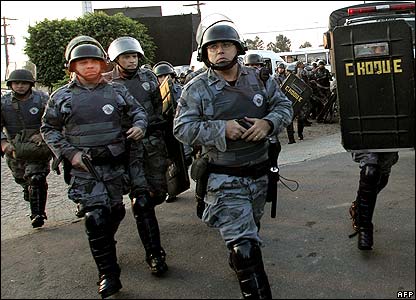Brazilian police: real experts in lethal violence
 It's been six days since rioting broke out in Brazilian cities, some put the death toll at over 150. The BBC also reports that the Brazilian police have been 'heavily criticised' by human rights organisations for killing over '109 suspects' within a week. The Brazilian authorities are trying very hard to play down the high death toll by stating that they had only shot and killed '79 suspects' this week.
It's been six days since rioting broke out in Brazilian cities, some put the death toll at over 150. The BBC also reports that the Brazilian police have been 'heavily criticised' by human rights organisations for killing over '109 suspects' within a week. The Brazilian authorities are trying very hard to play down the high death toll by stating that they had only shot and killed '79 suspects' this week.A spokesman for the National Movement for Human Rights, Ariel de Castro Alves, told the BBC that anywhere up to 'a third of those killed by the police appeared to have been innocent civilians'. Amnesty International (AI), is also extremely worried about the lethal tactics used by the Brazilian police. AI even highlighted in their 2005 report on Brazil, that 'ineffective, violent, and corrupt policing', as well as police 'death squads', threatened the Brazilian governments proposals for reform.
All this talk of arbitrary, lethal violence from the Brazilian police, in one week, reminds me of the killing of Charles de Menezes back in July 2005. Few will remember the Brazilian police and authorities, coming over to Britain last year, to start a three day grilling session of the Metropolitan Police, about the tragic accidental killing of Menezes. Even then, I wanted to know what right the Brazilian state had to humiliate the MET about ‘shoot to kill’ policies in London? Who are they to talk about the fallibility of the use of shoot to kill? What about the 79 people the Brazilian police said they killed, just in this week alone? Indeed, what about the 'slaying' of 30 men, women and children allegedly gunned down by Brazilian policemen in Rio de Janeiro only last year?
The killing of Menezes was, indeed, an appalling accident - no more, no less. However, there is a huge, huge difference between the MET and the Brazilian police force, as graphically depicted by events in Brazil this week – even historically speaking, trigger-happy policemen have not been terribly hard to find in Brazil.
Picture: Brazilian Police in Rio. BBC News

















0 Comments:
Post a Comment
<< Home